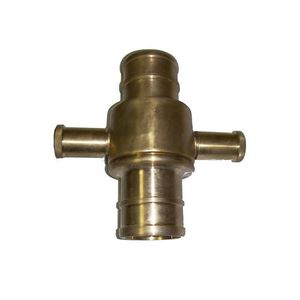Hose Couplings
Hose Coupling is a connector on the end of a hose to connect or couple it with another hose or with a tap or a hose appliance, such as an irrigation sprinkler. It is usually made of steel,brass, stainless steel, aluminium or plastic.
Types
Air King
The Air King Universal Air Hose Coupling is malleable iron or brass quarter turn sexless coupling usually found on pneumatic tools like jackhammers. The fitting is considered universal because a common two lug head is used on all sizes ranging from 1/4" through 1".
Cam and groove
A Cam and groove is a quick connect fluid transfer hose coupling that consists of a male adapter and female coupler. The adapter has a groove on the outside that is engaged by the cam arms on the outside of the coupler to effect a seal against the gasket inside the coupler. They are most commonly found in petroleum or chemical applications.
Ground joint
A Boss Ground Joint Coupling valve hose coupling is primarily used for compressed air or steam. It consists of a stem, wing nut and spud. It seals as a soft copper seat located in the spud is drawn against the stem by tightening the wing nut.
Hoselink
Hoselink is a bayonet type connector utilizing an 0 Ring compression to provide a watertight connection for home and commercial garden hoses.
Hozelock
Around 1955 Hozelock Ltd UK invented & patented the international standard plastic, click-on style, push-fit hose end connector now used with garden hoses. The concept was developed to replace metal hose end connectors in coal mines which were prone to cause static sparks & the possibility of methane gas explosion. The system is now universally used by gardeners throughout the world.
Storz
A Storz coupling is a quarter turn coupling, or sexless coupling, commonly used to connect to fire hydrants, easy to connect, no particular male or female end, lugs are on inside of coupling. This is the standard coupling on fire hoses in Denmark, Germany, Austria, Switzerland, and the Netherlands.
Guillemin symmetrical clutch
The Guillemin symmetrical clutch is widely used in France and in Belgium by firefighters to couple fire hoses. It is also commonly known under the name of DSP connector.It can be fastened by hand, but it is also possible to use a tricoise wrench. It is also quarter turn and sexless. Each end has a ring with two protuberances outside; when the ring turns, the protuberances lock to the hook of the other hose.
Barcelona
It is the coupling used by the Spanish firefighters. It is a sexless coupling with 3 engaging lugs.
Nakajima
A quarter turn or sexless coupling used tre on fire hoses in Japan.
Gost
A sexless coupling used on fire hoses in Russia.
Machino
A quick connect and disconnect coupling used on fire hoses in Japan.
NST
National Standard Thread (NST), also known as National Hose thread (NH). The most common type of fire hose coupling used in the USA. The male and female straight threads screw together and the connection is sealed with a gasket.
Expansion ring
A expansion ring fire hose coupling is commonly used on lay flat fire hose, it has the advantage of providing no flow restriction, as the expansion ring is expanded to match the inner diameter of the hose. They are installed with special machinery using a drawbar expander. In the US it is most commonly supplied with NST (NH) threads.
